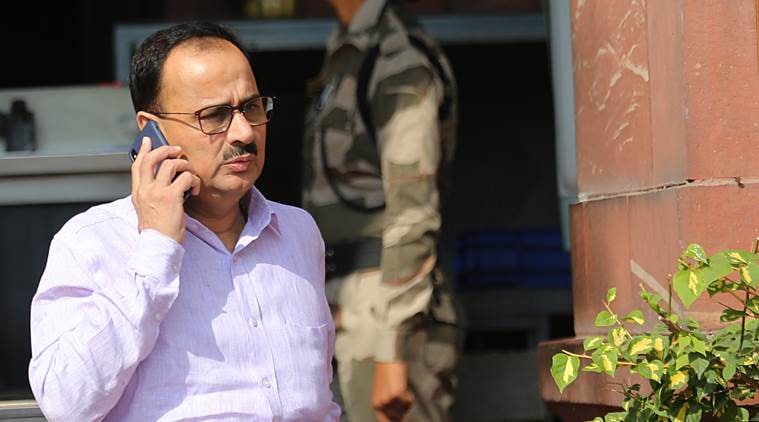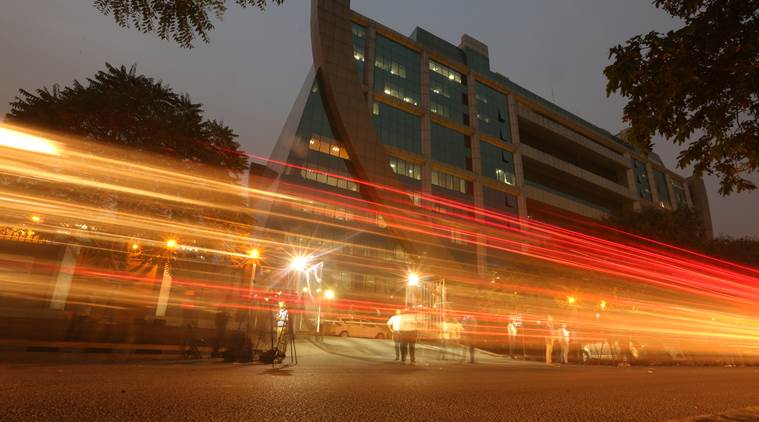 Alok Verma on Tuesday. (Express Photo/Tashi Tobgyal)
Alok Verma on Tuesday. (Express Photo/Tashi Tobgyal)
The Supreme Court Friday set a two-week deadline for the Central Vigilance Commission (CVC) to complete its probe against CBI Director Alok Verma who, along with Special Director Rakesh Asthana, was stripped of all responsibilities and sent on leave Tuesday night. Justice A K Patnaik, a retired judge of the Supreme Court, will monitor the CVC probe.
A bench of Chief Justice of India Ranjan Gogoi, Justices S K Kaul and K M Joseph, while hearing petitions by Verma and NGO Common Cause against the government move, also restrained interim CBI Director M Nageshwar Rao from taking any “policy decision(s) or any major decision(s)” and directed that he “will only perform the routine tasks that are essential to keep the CBI functional”.
The bench made it clear that it will look into all decisions that Nageshwar Rao has taken till date, including “transfer of investigations, change of Investigating Officer(s) etc”.
Senior advocate Fali S Nariman appeared for Verma and senior advocate Dushyant Dave for Common Cause.
After hearing the lawyers of the petitioners, the bench directed that notices be issued in both the writ petitions and the matter be “listed immediately after the Diwali holidays i.e. on 12th November, 2018”.
The bench declined to take up for hearing a petition filed by Asthana, saying “you missed the bus”.
Senior advocate Mukul Rohatgi, appearing for Asthana, said he had filed a writ petition and it should be heard. At this, the CJI told him: “Why are you late? You missed the bus. Your petition is not before us.” Rohatgi said he will file it and requested the court to hear him Monday. The bench said it will look into it.
 The CBI headquarters (Express Photo/Tashi Tobgyal)
The CBI headquarters (Express Photo/Tashi Tobgyal)
In its order, the bench said: “Having heard the learned counsel for the parties at some length, we are of the view that the following interim arrangement should govern the situation:
* The enquiry in respect of the allegations made in the note/letter of the Cabinet Secretary dated 24th August, 2018 as regards the present Director, Central Bureau of Investigation (“CBI”) Shri Alok Verma shall be completed by the Central Vigilance Commission (“CVC”) within a period of two weeks from today. The enquiry will be conducted under the supervision of a retired judge of this Court Shri Justice A K Patnaik who is requested to accept the assignment and ensure that enquiry is completed within the time frame fixed by this Court.
* The respondent No.6 — M. Nageshwar Rao in Writ Petition (Civil) No.1315 of 2018 who has been entrusted with the task of looking after the duties of the Director of the CBI by the impugned order dated 23rd October, 2018 of the Secretary, Department of Personnel & Training, shall, as of from now, not take any policy decision(s) or any major decision(s) and will only perform the routine tasks that are essential to keep the CBI functional. A list of all the decisions taken by the respondent No. 6 — M Nageshwar Rao between 23rd October, 2018 and upto this hour including decisions with regard to transfer of investigations, change of Investigating Officer(s), etc. etc. will be furnished to the Court in a sealed cover on or before 12th November, 2018 whereafter orders as would be appropriate will be passed by the Court.
* We make it clear that entrustment of supervision of on-going enquiry by the C.V.C. to a former judge of this Court is one-time exception which has been felt necessary by this Court in the peculiar facts of this case and should not be understood to be casting any reflection on any authority of the Government of India.”

Earlier, Nariman began the arguments on Verma’s behalf, drawing the attention of the court to the ruling in the Vineet Narain case which insulated the CBI from the government.
Referring to Section 4(A) of the Delhi Special Police Establishment Act, Nariman said the CBI Director is appointed by a high-powered committee comprising the Prime Minister, Leader of Opposition and Chief Justice of India and enjoyed a fixed tenure of two years. Prior consent of this committee, he said, is needed for his transfer. The question was, he said, whether this two-year tenure could have been breached.
Nariman narrated the sequence of events leading to the orders of the CVC and government divesting Verma of his powers and the appointment of Nageshwar Rao.
At this, the CJI said: “We will examine the matter.” Turning to Attorney General K K Venugopal: he said “today, we need to see what interim orders to pass. Without wasting your time, we will tell you what we have in mind”.
The bench then went on to state its proposals.
The CJI said the court was of the view that “the ongoing CVC enquiry against Verma be completed within ten days under the supervision of a sitting or retired judge of Supreme Court. The present incumbent should discharge only administrative functions and not take any policy decisions of serious consequences”. He said the government and the CBI must also furnish a list of decisions taken by Nageshwar Rao following his appointment.
Solicitor General Tushar Mehta, appearing for the CVC, raised the apprehension that monitoring the probe by the Commission would reflect on the body. “Let CVC alone examine this matter instead of anyone supervising us,” he urged the court.
Mehta cited Section 14 of the CVC Act, 2003 and stated that the CBI was statutorily accountable in its functions. The Commission, he said, submits an annual report to the President that has a part dedicated to the CBI’s functioning. This is also presented to Parliament.
“When I am discharging this function which would finally be examined by Parliament, then there should not be any other supervision,” Mehta said.
Venugopal expressed doubts whether the probe could be completed in ten days given that there were too many documents. But the CJI said “at this point, the scope of inquiry is limited to finding out whether there is any case prima facie. You do not have to go through thousands of pages for this”.
Mehta again pressed for more time, saying the CVC was yet to receive some documents it had been seeking since August.
“OK, then 240 hours,” the CJI replied, much to the merriment of those present in the court room. “No, Mr Solicitor General, we don’t want this to go on. This is not in the interest of the country.”
Mehta persisted and sought three weeks, citing Diwali holidays. The CJI then told him: “What is the court closing on Diwali got to do with the CVC inquiry? Diwali is only for one day and 24 hours… CVC, CBI, Attorney… no Diwali.”
Dushyant Dave, appearing for Common Cause, said that in 2017, the CVC had said that it could not look into complaints against Asthana as they had not proved misconduct, and wondered why it was now acting on allegations not proved.
He also raised the issue of transfers effected by the interim Director after his appointment earlier this week.
With the Attorney General and Solicitor General seeking more time, the court finally gave them 14 days in its order though it had initially suggested 10 days.